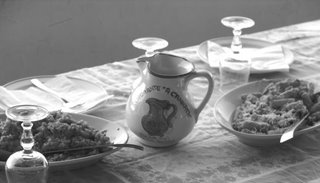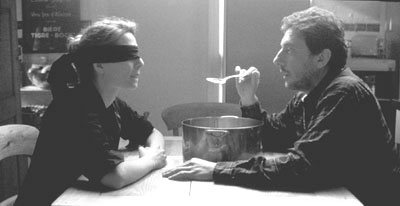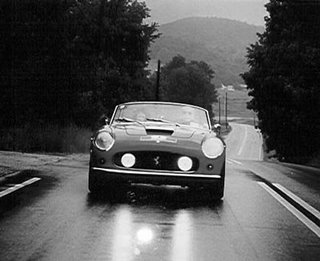5. "I'll Have Bratwurst With That Spaghetti"
If you have ever seen the film Mostly Martha, you have a hint of what our life together would be, mine and Mario’s. First, we left that night from the tapas bar, warmed by good wine and good company.
He was taller and younger than I expected. I was smaller and…more brunette. Maybe a better comparison would have been to say that he was of a more Italian temperament, and I was more Teutonic.
We vowed to meet again, as soon as it was convenient. I hoped that he would go away comforted. I liked him.
 Our second meeting took us to a local restaurant that was sired upon potential. It was an Italian restaurant that wanted to be truly, madly authentic in a city of meatballs and marinara.
Our second meeting took us to a local restaurant that was sired upon potential. It was an Italian restaurant that wanted to be truly, madly authentic in a city of meatballs and marinara.The food we had was good – if esoteric for the community. What I remember is sitting out on the patio, an awning over our heads to keep us dry as a spring storm raged. No one out there but us two, cosseted by the moist air, bathed in candlelight.
More than anything, it was warm and golden. An entwining of spirits as we shared more, bit by bit.
One of the things you lose when the Great Love of your life dies is the couple culture you have nurtured together. It doesn’t matter whether you believe the spirit goes to a better place or becomes a trumped-up version of road kill. The culture that you shared – the patois that defined your special relationship – is gone. No one ever quite gets it in the same way.
 Mario and I weren’t intending to start a couple culture of our own. But the passion of our losses propelled us. We began to speak more of “them.” We began to share them. Their habits. Their sense of humor. Their ways of sharing.
Mario and I weren’t intending to start a couple culture of our own. But the passion of our losses propelled us. We began to speak more of “them.” We began to share them. Their habits. Their sense of humor. Their ways of sharing.I understood why Mario loved Isabel. She adored him. Pure and simple. She accepted him. Without reservation. Her rhythms fit with his.
Take driving. Mario was quite an offensive-defensive driver, seasoned by bouts on the roads of Italy. Back in the States, he would do things like drift over toward the line between lanes on the freeway to “push back” a cell-phone-wielding soccer mom in a bloated SUV who was straying toward his space. He would drive fast, eyes red and flaming, as he passed the incompetent knuckleheads around him. He was a white Volvo with attitude.
Izzy, in her serenity, called it “Idiot-Watching With Mario.”
 Gregory just liked to drive fast. Fast and hard. He had a quasi-sports-car 5-speed, nerves of steel, and was Cool Hand Luke under fire.
Gregory just liked to drive fast. Fast and hard. He had a quasi-sports-car 5-speed, nerves of steel, and was Cool Hand Luke under fire.He refused to wear a seatbelt until my daughter Helena challenged him on it. With the same assertion and directness of character that he displayed, she told him, “I want you to put on your seatbelt. Now.”
She was 7. And, to my amazement, Gregory put on his seatbelt then and there, and put it on ever after, whether she was in the car or not. Something between them connected.
No matter how much Gregory had had to drink (and he drank as hard as he drove), no matter how far we were from home, I always had faith that he would get us back home in one piece.
When I went “Idiot Watching With Mario,” I sometimes cringed and gasped at Mario’s moves. I chewed on him for his seemingly wild antics. My breath would catch, and I’d grab the door-handle when he came close to a car in the next lane.
In time, I came to accept his Italian, quasi-madman ways on the road. But it was never the same as when Gregory was driving.
For whatever reason, I could not make Mario as perfect and right as Izzy had made him. Or as perfect and right as I made Gregory.
But still, it was a beginning. Our beginning.


 It can take a while to move from the initial shock to grieving. On the night I learned of Gregory’s death, I don’t remember exactly when I started to cry. But very late, tiny wisps of feeling began to penetrate that fragile feather barrier. Tears began to accumulate and fall, like droplets from melting snow.
It can take a while to move from the initial shock to grieving. On the night I learned of Gregory’s death, I don’t remember exactly when I started to cry. But very late, tiny wisps of feeling began to penetrate that fragile feather barrier. Tears began to accumulate and fall, like droplets from melting snow.





